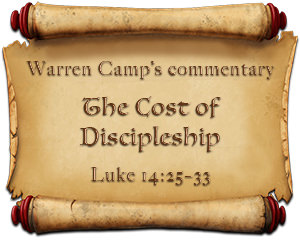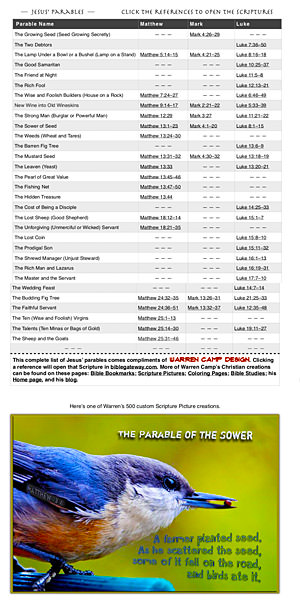
Jesus told this parable in order to reveal to his listeners — those considering following him and those who’d already made that decision — several prerequisites regarding becoming his disciple and being an active follower of him in God’s kingdom.

† Find Warren’s short summary at the bottom of page.

Click the list or the “bird” to enlarge and use Warren’s list of forty-four of Jesus’ parables (a PDF file with links to Scriptures).
Start Reading Warren’s Commentary . . .
Find his summary at the bottom.
par•a•ble [noun] a simple story used to illustrate the meaning of or a moral or spiritual lesson, as told by Jesus in the gospels
synonyms: allegory, moral story/tale, fable
Jesus’ Parable of the Cost of Discipleship
Luke 14:25–33
Jesus, who was a carpenter by trade, once told a construction miniparable about counting the cost of following him. “Suppose one of you wants to build a tower,” he asked. “Won’t you first sit down and estimate the cost to see if you have enough money to complete it?” (14:28). Another miniparables follows about a king who considers the cost of going to war (v. 31) that makes the same point. Speaking to the “large crowds…traveling” with him (v. 25), Christ wanted them to understand that there was a cost to sincerely believing in and following him. To truly follow Jesus Christ, we must consider the cost of doing so while putting him above everything else in our lives. Yes, everything else!
Let me state this more clearly: Jesus Christ freely offers the water of life to everyone who thirsts. But we need to first understand that when we receive his free salvation offer, we become someone else; we’ve been bought at a price. To truly follow Christ, we must appreciate such cost and keep ourselves from following him superficially, only to return to our worldly priorities when things get challenging for us. It’s that casual air about following him and learning from him as a disciple that Jesus warns against in our text.
This animated video comes compliments of CCO Youth
The Parable of the Cost of Being a Disciple
Jesus again saw a large crowd traveling with him, perhaps setting up a moving tent city as he traveled from town to town. He became concerned suspecting that there’d be little in the way of commitment from many who followed in the throngs of curious multitudes.
The Parable of Becoming a Disciple
25Large crowds were traveling with Jesus, and turning to them he said: 26“If anyone comes to me and does not hate father and mother, wife and children, brothers and sisters — yes, even their own life — such a person cannot be my disciple. 27And whoever does not carry their cross and follow me cannot be my disciple” (Luke 14:25–27).
He knew that many were following him for selfish or superficial reasons. It was, after all, the exciting thing to do. Seemingly distrusting the devotion to him that many in the crowd expressed, Jesus turned to the people and spoke to them in the strongest possible terms: Unless a person “hates” even his close family members, and himself, he can’t be a disciple of mine. (Wow!)
Rick Renner reveals (in Sparkling Gems from the Greek) that the word “hate” in v. 25 “is taken from the word miseo. It’s one of the strongest, fiercest words in the Greek New Testament. In fact, it is so strong that it actually carries the idea of a hatred that can turn violent.” Renner continues, “Miseo is also used in Revelation 2:6 and 2:15, when Jesus declared that he “hates” the deeds of the Nicolaitans. In Jesus’ opinion, their deeds and teachings were repugnant, disgusting, revolting, repulsive, and nauseating.” Jesus was and is using hyperbole — an overstatement — to make a point with the maximum impact.
What does Jesus mean by telling us that we must hate our closest family members? Dr. Ralph F Wilson answers accordingly: “He is contrasting our allegiance to Jesus in the strongest possible way. No earthly tie, however close, must take precedence over our allegiance to and obedience of Jesus. He is Number One -- by far! No person even comes close!”
For us to believe in Jesus Christ, we must see him as Lord of the universe and Lord of our lives. If we claim to be a believer but fail in our efforts to grow in obedience to Christ, we’re fooling ourselves. Yes, it’s possible to follow Christ superficially; it’s to such followers that Jesus lays out the cost of discipleship in this parable. He knows that our battle(s) will be intense. And he doesn’t want to recruit anyone under false pretenses. Thus, to follow Christ truly, devotedly, and effectively, we must consider the cost.
In addition to saying that everyone who wants to become one of his disciples must “hate” everyone and everything, Jesus also says that they must carry their cross. Having made this statement about the cross before his crucifixion indicates that he was predicting his crucifixion. The taking up and carrying our cross is to be a conscious decision to follow Christ, no matter the cost. It’s not deliberately courting persecution or martyrdom; it’s willingly submitting to it when it results from our faithful discipleship. You can see Jesus’ iterations of his requirement to carry our cross in Matthew 16:24; Mark 8:34; Luke 9:23, 14:27, and on my animated “Carry Your Cross” testimonial.
Remember! To take Jesus literally in his usage of “hate” would be a mistake. Such an ultimate directive would oppose all of his teachings about “loving others.” He used “hate” in this passage as an idiom, which is one of many figures of speech that Jesus used. An idiom is a commonly used expression whose meaning doesn’t relate to the literal meaning of its words (e.g., flowing with milk and honey, house of bondage, forbidden fruit, go the extra mile, writings on the wall, and so on). We can know that Jesus intentionally used his “hate” idiom here only to get his listeners’ attention. Matthew quotes Jesus when he made a parallel comment, albeit stated literally: “Whoever loves father or mother more than me is not worthy of me; and whoever loves son or daughter more than me is not worthy of me” (Matt. 10:37). Both passages relate to loving more or loving less. Jesus isn’t advocating, or even permitting, the lack of familial devotion or parental love; he’s asserting the absolute supremacy of his claims on his people: Nothing and no one is permitted to come between a disciple and his Lord.
Likewise, in v. 27, when Jesus says we must carry the cross in order to follow him, he’s again speaking figuratively. What Jesus is actually saying is that we’re to model his sacrifice and obedience to become a true and devoted follower of his. Therefore, according to Jesus, in order for us to be a follower of his, we must love God more than everyone else, even more than ourselves. We also must model Jesus’ sacrifice and obedience, living in complete obedience to the heavenly Father, as he did; otherwise, Jesus says we’re not worthy of him, which means we’re not worthy of salvation.
After laying out the first two costs of discipleship (“hating loved ones” and “carrying a cross”) in vv. 26–27, Jesus gives us and his listeners two additional miniparables (v. 28–32) that make the same overall point, namely, that a person must give careful consideration to cost before he rashly accepts making commitments. Then he summarizes his point by giving his cost of discipleship conclusion (v. 33). He then gives an illustration about salt to exemplify the cost of not truly following him (vv. 34–35). He ends his parable with an attention-getting warning: “He who has ears to hear, let him hear.”
The Miniparable of the Tower Builder
28“Suppose one of you wants to build a tower. Won’t you first sit down and estimate the cost to see if you have enough money to complete it? 29For if you lay the foundation and are not able to finish it, everyone who sees it will ridicule you, 30 saying, ‘This person began to build and wasn’t able to finish.’
The Miniparable of Counting the Cost of War
31“Or suppose a king is about to go to war against another king. Won’t he first sit down and consider whether he is able with ten thousand men to oppose the one coming against him with twenty thousand? 32If he is not able, he will send a delegation while the other is still a long way off and will ask for terms of peace” (vv. 28–32).
Think for a moment about the phrases, “sit down and estimate the cost,” referring to the man building a tower (v. 28), and “sit down and consider,” referring to the king contemplating going to war (v. 31). Both phrases refer to careful, detailed, rational thinking that’s made up of proactive examination of all aspects and options of what one might be getting into before making such a commitment. Careful thought is the opposite of an impulsive decision made during a moment of intense emotion without first appreciating the consequences.
After telling the two parables about considering the cost before making a commitment, Jesus tells us in v. 33, “In the same way, those of you who do not give up everything you have cannot be my disciples.” Is that another idiom he uses? Or does Jesus mean this literally? [See this illustration highlighting the extent that one would “give up everything that he had to own something valuable.”]
The Cost of Not Following Christ If we profess to follow Christ but go back on our commitment, people will ridicule us the way they’d mock a man who started to build a tower but couldn’t complete it, or jeer at us as we face the damaging effects of being defeated by the enemy because we didn’t initially consider the intensity of the battle we’d face.
Billy Graham said, “In Jesus’ day, a cross wasn’t just a symbol of pain and suffering; it was mainly a symbol of death. What Jesus was telling them is that they needed to put to death their own plans and desires, and then turn their lives over to Him and do His will every day.”
Please Pass the Salt In vv. 34–35, Jesus uses a third illustration to show the cost of not following him, that of salt that’s become tasteless. Such tasteless salt was worthless for any useful purpose and had to be tossed away. Jesus is saying that if a follower of his doesn’t live accordingly, he’s useless to God.
Salt, then, was considered an essential of life, used for flavoring and preservation. Today we’re used to buying refined salt off the store shelf. In Jesus’ day, salt was obtained through evaporation from the Dead Sea, and it was far from pure; it was often mixed with greater or lesser concentrations of other salts. It was possible for all the sodium chloride to be leached out of a mixture of salts causing what was left to be stale and useless.
If we have so conformed our ways and words to the world around us that people can’t see the Spirit of Christ within us, alas, we aren’t the salty disciples that Jesus wants us to be. That’s the warning he gives you and me in this Cost of Discipleship Parable.
“Whoever has ears to hear, let them hear” (v. 35b).
A Hearty Way to Apply This Parable Today
Following Jesus only because of what he can do for us is a “road to nowhere.” But, following him, for him — turning daily from sin and self-focus to live for him and his kingdom (carrying our “cross,” as he put it in v. 27 — changes everything. The cost must be counted… but he’s worth it!
The road to salvation is not as cheap and easy as some may think. It costs us everything! And it’s a difficult road to take. Jesus makes this clear by saying, “Enter through the narrow gate; for the gate is wide and the road is easy that leads to destruction, and there are many who take it. For the gate is narrow and the road is hard that leads to life, and there are few who find it” (Matt. 7:13–14). This fact didn’t change after Jesus died and rose from death. He makes this statement in relation to the new covenant that he continues to establish, and clarifies what he means by his Cost of Discipleship Parable, as well as his other comments on this subject.
Just as the man building a tower should first consider if he can complete it before he starts construction, likewise we should consider the cost to us of our being given the gift of salvation and its terms of acceptance.
Jesus further clarifies his message by ending this Cost of Being a Disciple Parable with the statement, “So therefore, none of you can become my disciples if you do not give up all your possessions” (v. 33). Similar to his previous statements about loving him more than people and life, Jesus is telling us that we must let go of our attachment to possessions, “for one’s life does not consist in the abundance of possessions” (12:15).
Question 1 Jesus’ words in this parable are tough and sobering! Is he the Lord of your plans, your thoughts, and of all that you do? Or, could you selfishly be clinging to your plans, to your way, instead of seeking to please him in all things?
Salvation is absolutely free, but once you receive it, it costs you everything. To truly follow Christ, you must consider the cost while putting him above everything else. Can you hear me now? “He who has ears to hear, let him hear.”
Question 2 What price have you had to pay to follow Christ? How hard or easy has this been?
Question 3 On a scale of 1 (Come again?) to 10 (I’m all ears!), how receptive are you to Christ’s call to discipleship in his kingdom?
“And whoever does not carry their cross and follow me cannot be my disciple” (Luke 14:27).

Take our “Parables Quiz.”
See Warren’s other “Parables of Jesus” commentaries.
— Warren’s Concise Summary —
The Cost of Discipleship Parable has Jesus telling us a story to emphasize the high cost of true discipleship. He urges the nearby crowd to count the cost of following him, just as a builder estimates the cost before starting to construct a tower, just as a king evaluates the strength of his army before going to war.
Jesus warns that [our] discipleship requires total commitment — placing him above family, possessions, and even one’s own life. The parable underscores this: that following Christ isn't a casual decision but a serious, sacrificial commitment.


